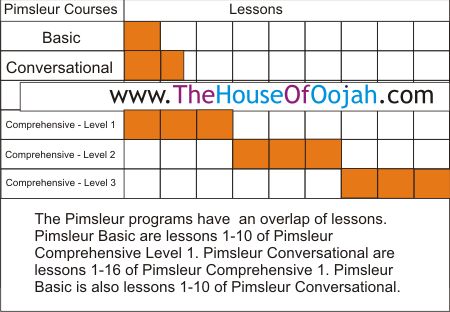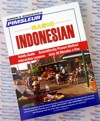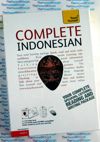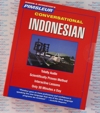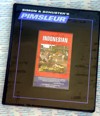Pimsleur Basic Indonesian 5 Audio CDs - Learn to Speak Indonesian
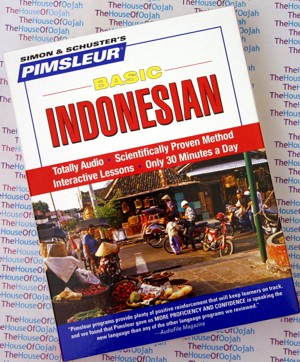
Pimsleur Basic Indonesian10 lessons - 5 Audio CDsGet other Indonesian Audio Language Learning - click here |
 |
Pimsleur Basic Indonesian - 5 Audio CDs Brand New : 5 CDsThe Pimsleur Method provides the most effective language-learning program ever developed. The Pimsleur Method gives you quick command of Indonesian structure without tedious drills. Learning to speak Indonesian can actually be enjoyable and rewarding.
The key reason most people struggle with new languages is that they aren't given proper instruction, only bits and pieces of a language. Other language programs sell only pieces — dictionaries; grammar books and instructions; lists of hundreds or thousands of words and definitions; audios containing useless drills. They leave it to you to assemble these pieces as you try to speak. Pimsleur enables you to spend your time learning to speak the language rather than just studying its parts. When you were learning English, could you speak before you knew how to conjugate verbs? Of course you could. That same learning process is what Pimsleur replicates. Pimsleur presents the whole language as one integrated piece so you can succeed. With Pimsleur you get:
Millions of people have used Pimsleur to gain real conversational skills in new languages quickly and easily, wherever and whenever — without textbooks, written exercises, or drills
About the Indonesian LanguageIndonesian (Bahasa Indonesia) is the official language of Indonesia. Indonesian is a standardized dialect of the Malay language that was officially defined with the declaration of Indonesia's independence in 1945 although in the 1928 Indonesian Youth Pledge have declared it as the official language. Indonesia is the fourth most populous nation in the world. Of its large population the number of people who fluently speak Indonesian is fast approaching 100%, thus making Indonesian one of the most widely spoken languages in the world.Most Indonesians, aside from speaking the national language, are often fluent in another regional language or local dialect (examples include Minangkabau, Sundanese and Javanese) which are commonly used at home and within the local community. Most formal education, as well as nearly all national media and other forms of communication, are conducted in Indonesian. In East Timor, which was an Indonesian province from 1975 to 1999, the Indonesian language is recognised by the constitution as one of the two working languages (the other is English, alongside the official languages of Tetum and Portuguese). The Indonesian name for the language is Bahasa Indonesia (lit. "the language of Indonesia"). In the same way that English speakers would refer to the official language of France as "French" (not Français), the most accurate way of referring to Indonesia's national language in English is "Indonesian". However, the foreign term Bahasa Indonesia can sometimes still be found in written or spoken English. In addition, the language is sometimes referred to as "Bahasa" by English-speakers, though this simply means "language" and thus is also not an official term for the Indonesian language. Linguistics To a certain degree, Indonesian can be regarded as an open language. Over the years, foreign languages such as Sanskrit, Chinese, Arabic, Portuguese, Dutch and English have enriched and expanded the Indonesian language, mostly through trade contacts and international media. Because of its semi-open status, there are those who regard Indonesian (as well as other forms of Malay) as lacking sufficient vocabularly and specialist terminologies. Yet some linguists consider this view to be a misconception, as a vast majority of foreign adopted words do have native equivalents. For example, the word asimilasi (from the Dutch word assimilatie) can also be expressed in Indonesian as penggabungan. Many words describing more modern inventions, objects or ideas are often Indonesianised adoptions of foreign words (e.g. computer becomes komputer), although many of these words also have Indonesian equivalents. For example, a "cell/mobile phone" can be referred to in Indonesian as either pon-sel/ telepon seluler (lit. cellular-telephone), HP (pronounced hah-péh - the acronymic form of hand phone) or telepon genggam (lit. "hold-in-the-hand telephone"). Other words such as "rice cooker" may be referred to simply as "rice cooker" or, again, in a more native Indonesian/ Malay form, i.e. penanak nasi (a word formed from the verb menanak, meaning 'to cook rice by boiling' + nasi, meaning 'cooked rice'). Overall, the use of native and non-native words in Indonesian is equally common and reflects the country's efforts towards modernization and globalization. Many aspects of Indonesian grammar are relatively simple in the initial stages of study, making it one of the easiest languages to learn for adults. Indonesian does not require conjugation of verb tenses or participles, plural forms, articles and gender distinction for the third person pronouns. It is important to note that neither do many other languages traditionally regarded as 'complex', including Chinese (see Chinese grammar) and Thai for example. In spite of this, Indonesian and Malay are generally regarded as easy languages to learn, mostly because they are not tonal languages and they no longer use complex characters within their writing system, but rather utilize the Latin alphabet. Similar cases can also be seen in other Southeast Asian languages such as Vietnamese and Tagalog. However, Indonesian does possess a complex system of affixations. The absence of tenses in the language is substituted through the use of aspect particles and (as with any language) Indonesian grammar often presents an array of exceptions. Also, the simplicity of Indonesian grammar at a beginners or basic level has the disadvantage of misleading many learners of the language into thinking that more advanced Indonesian grammar is just as simple.
|
Pimsleur Basic Indonesian - 5 Audio CDs |
| Stock Info: | Out Of Stock |
| Receive In Stock Notification |

 0 Items (Empty)
0 Items (Empty)